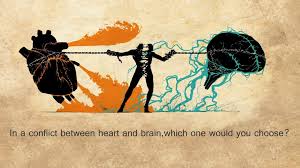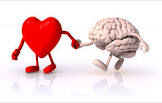Heart vs. Brain: Who Really Controls Emotion?

The Old Battle Between Logic and Feeling
For centuries, the heart has been crowned the ruler of emotions. Poets swore by it, Lovers blamed it. Even languages around the world built idioms around it, broken heart, heartache, heavy-hearted, kind-hearted. The brain, on the other hand was seen as the seat of reason cold, calculating, analytical But biology doesn’t bend easily to poetry.
When scientists started peering inside the skull with electrodes and imaging scanners, they found that emotions lit up the brain like fireworks. Fear, love, joy, anger, each had its neural fingerprint. The limbic system, the amygdala, hypothalamus and prefrontal cortex emerged as the emotional command center.
So does that mean the heart’s just a helpless pump? Not quite because even as science crowned the brain king, the heart refused to step down. And maybe, just maybe, it shouldn’t.
Emotion isn’t just felt in the mind. It’s lived through the body. Your heart, gut, and skin all join in communicating through electrical signals, hormones, and nerve fibers. The brain may spark emotion but the heart amplifies it, translates it and sometimes even influences it in return.

The Science of Emotion: The Brain’s Symphony
When someone yells your name, your amygdala jumps into action. It’s the emotional alarm system. In milliseconds, it assesses whether the event is threatening, exciting, or meaningless.
If it’s emotionally charged, the hypothalamus releases hormones like adrenaline and cortisol, preparing your body for response racing heart, sweaty palms, tense muscles. Then the prefrontal cortex, the rational part, steps in to interpret what’s happening, Are you in danger? Are you just nervous? Or thrilled?
This triad creates the emotional narrative, The amygdala gives intensity.The hypothalamus triggers reaction and The cortex gives meaning. Emotions begin in the brain electrical sparks weaving into chemical storms. But that’s not the full story. Because after the brain sends the signal, the body talks back and that’s where the heart enters the story as more than just a poetic metaphor.
The Heart’s Hidden Intelligence
The heart is not just a muscle, It’s a communicator. It has over 40,000 neurons, its own mini nervous system sometimes called the “heart brain.” It constantly sends signals to the actual brain through the vagus nerve, influencing how you feel, think, and react.About 80% of the nerve communication between the brain and heart flows upward from the heart to the brain, not the other way around. That means your heartbeat patterns can directly shape your emotional state.
For instance, when your heartbeat is erratic (like during stress), your brain interprets that as anxiety or discomfort. When your heartbeat is stable and rhythmic, your brain reads it as calm and safety. This is called heart rate variability (HRV) and it’s one of the strongest indicators of emotional regulation.
That’s why deep breathing, meditation, or simply placing a hand on your chest can change your mood. You’re not just calming your mind, you’re literally coaching your heart to send different emotional signals to your brain.
The heart doesn’t just react to emotion, it creates emotional feedback.
“my heart feels heavy” statement is not wrong. Your body and brain are having a physiological conversation about emotion and the heart has a loud voice in that dialogue.
The Emotional Tug-of-War
For instsance You’re about to give a speech, Your brain knows the words. You’ve practiced them for days but your heart? It’s pounding, erratic, wild. Your palms sweat, your voice trembles, Logic says, you’re fine but The heart screams, Leave!
This is the classic heart-brain conflict, the biological version of internal drama. The brain operates in thoughts and predictions. The heart speaks in rhythm and feeling, When they agree, you feel aligned, confidence, peace, flow. When they clash, you feel torn, anxiety, hesitation, confusion.
Neuroscientists call this coherence, when your mental and physical signals synchronize. It’s not just a metaphorical “peace of mind”; it’s measurable. In moments of coherence (like gratitude or love), your heartbeat and brain waves form smooth, harmonious patterns.
During fear or anger, they become jagged and disjointed, an inner storm visible on a graph.
So, the next time you “follow your heart,” it’s not blind emotion. It’s neurophysiological wisdom. The heart is giving your brain data about what feels safe, fulfilling or right and that’s what makes human emotion so complex, It’s not one organ against another. It’s a duet sometimes harmonious, sometimes chaotic but always deeply human.
When the Brain Overrules the Heart
The brain can override the heart and sometimes must, After a loss or heartbreak, your limbic system floods your body with grief signals, heavy chest, slow heartbeat, pain that feels physical. The heart slows, literally aches but t over time, the prefrontal cortex steps in to process and make sense of the pain. It helps you reframe, recover, rebuild.
That’s why emotional healing isn’t instant, it’s the brain slowly retraining the body to find safety again. The heart feels faster; the brain understands slower. Together, they balance. Then there’s love the brain’s greatest paradox. When you fall in love, the limbic system floods you with dopamine, serotonin, and oxytocin. Your heart races, palms sweat, pupils dilate. The experience feels “from the heart,” but it’s also a neurochemical cocktail.
Yet, studies show that long-term love stabilizes the heartbeat and reduces stress hormones. The same rush that begins in the brain eventually ends with a calmer, healthier heart. The head ignites it, the heart sustains it. The brain may be the conductor, but the heart plays the melody.
The Heart’s Memory
Heart transplant recipients sometimes report new cravings, habits, or emotions that mirror those of their donors. A lifelong vegetarian craving chicken wings. A quiet person suddenly loving rock music.Science calls it cellular memory, though it’s still debated but one thing’s clear, emotions leave physiological traces in your heartbeat, hormones, and even immune cells.
Your heart beats about 100,000 times a day, and with every pulse, it carries not just blood, but experience. It learns what excitement feels like. What fear feels like. What heartbreak feels like. It doesn’t “think” the way the brain does but it remembers rhythms, emotional signatures of your life.
When you’re anxious, your heart doesn’t just speed up, it recalls that pattern from past fear. When you fall in love again, it echoes that familiar rhythm of connection.
So, in a poetic yet biological sense, yes the heart keeps record. Not of thoughts but of feelings.

The Verdict: Who Really Rules Emotion?
The truth is beautifully complicated, The brain interprets emotion and The heart expresses it. The brain generates the storm, the heart feels the thunder.The brain is your narrator, it explains, labels, and justifies.The heart is your sensor, it detects, reacts, and amplifies.You need both to be whole.
When you ignore the heart, you become logical but lifeless, analytical without empathy.When you ignore the brain, you become impulsive, led by passion without direction.
True emotional intelligence isn’t choosing one side, It’s listening to both frequencies at once.
In the quiet space between heartbeats and thoughts, emotion is neither fully physical nor fully mental, it’s the bridge between who you think you are and what you truly feel. whensomeone tells you to “use your head” or “follow your heart,” both are right.Your emotions are the language your body and brain speak when words fail.
Your heart sets the rhythm.Your brain writes the lyrics and together, they compose the song of every human moment, every rush of love, every ache of loss, every spark of courage. You are not ruled by one or the other,It’s brain and heart in sync, one sensing and one interpreting, both shaping the emotion you feel.
You are the music they make together.
Would you like me to make a short preview and tags (like your microbiome article) for this one too — something that would grab attention for posting or publication?
Recommended Articles
There are no posts under this category.You may also like...
Bundesliga's New Nigerian Star Shines: Ogundu's Explosive Augsburg Debut!

Nigerian players experienced a weekend of mixed results in the German Bundesliga's 23rd match day. Uchenna Ogundu enjoye...
Capello Unleashes Juventus' Secret Weapon Against Osimhen in UCL Showdown!

Juventus faces an uphill battle against Galatasaray in the UEFA Champions League Round of 16 second leg, needing to over...
Berlinale Shocker: 'Yellow Letters' Takes Golden Bear, 'AnyMart' Director Debuts!

The Berlin Film Festival honored
Shocking Trend: Sudan's 'Lion Cubs' – Child Soldiers Going Viral on TikTok

A joint investigation reveals that child soldiers, dubbed 'lion cubs,' have become viral sensations on TikTok and other ...
Gregory Maqoma's 'Genesis': A Powerful Artistic Call for Healing in South Africa

Gregory Maqoma's new dance-opera, "Genesis: The Beginning and End of Time," has premiered in Cape Town, offering a capti...
Massive Rivian 2026.03 Update Boosts R1 Performance and Utility!

Rivian's latest software update, 2026.03, brings substantial enhancements to its R1S SUV and R1T pickup, broadening perf...
Bitcoin's Dire 29% Drop: VanEck Signals Seller Exhaustion Amid Market Carnage!

Bitcoin has suffered a sharp 29% price drop, but a VanEck report suggests seller exhaustion and a potential market botto...
Crypto Titans Shake-Up: Ripple & Deutsche Bank Partner, XRP Dips, CZ's UAE Bitcoin Mining Role Revealed!

Deutsche Bank is set to adopt Ripple's technology for faster, cheaper cross-border payments, marking a significant insti...
